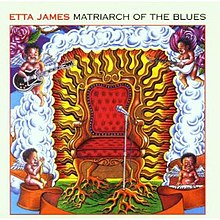
Jamesetta Hawkins, known professionally as Etta James, was an American singer and songwriter. Starting her career in 1954, James frequently performed in Nashville's famed R&B clubs, collectively known as the Chitlin' Circuit, in the 1940s, 1950s, and 1960s. She sang in various genres, including gospel, blues, jazz, R&B, rock and roll, and soul, and gained fame with hits such as "The Wallflower" (1955), "At Last" (1960), "Something's Got a Hold on Me" (1962), "Tell Mama", and "I'd Rather Go Blind". She faced a number of personal problems, including heroin addiction, severe physical abuse, and incarceration, before making a musical comeback in the late 1980s with the album Seven Year Itch (1988).

Delores LaVern Baker was an American rhythm and blues singer who had several hit records on the pop charts in the 1950s and early 1960s. Her most successful records were "Tweedle Dee" (1955), "Jim Dandy" (1956), and "I Cried a Tear" (1958).
Musicology Live 2004ever was a concert tour by American recording artist Prince to promote his Musicology album. The tour began on March 27, 2004 in Reno, Nevada and concluded on September 11 in San Jose, California. It was a commercial success earning $87.4 million from 77 shows in 52 cities across the United States and selling more than 1.4 million tickets. Prince said one of the goals of the tour was "to bring back music and live musicianship."
Private Music was an American independent record label founded in 1984 by musician Peter Baumann as a "home for instrumental music". Baumann signed Ravi Shankar, Yanni, Suzanne Ciani, Andy Summers, Patrick O'Hearn, Leo Kottke, and his former bandmates, Tangerine Dream. The label specialized in New age music but made a sharp turn to the mainstream by signing Taj Mahal, Ringo Starr, Etta James, and A. J. Croce. Its albums were distributed by BMG, which bought Private Music in 1996.
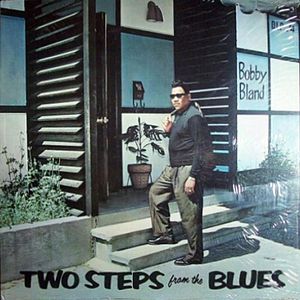
Two Steps from the Blues is the debut album by American blues singer Bobby Bland, in 1961. It compiles five songs recorded between 1956 and 1960 and seven songs recorded in two sessions from August 3 to November 12, 1960. The sessions took place at Universal Recording Corporation in Chicago, where Bland and his backing band moved after a series of successful singles and albums. The backing band was composed of Joe Scott and Melvin Jackson (trumpet), Pluma Davis (trombone), Robert Skinner and L. A. Hill, Rayfield Devers, Teddy Reynolds (piano), Clarence Holloman, Wayne Bennett, Hamp Simmons (bass), and John "Jabo" Starks (drums). Scott also served as an arranger.

The Bridges to Babylon Tour was a worldwide concert tour by the Rolling Stones. Staged in support of their album Bridges to Babylon, the tour visited stadiums from 1997 to 1998. It grossed over $274 million, becoming the second-highest-grossing tour at that time, behind their own Voodoo Lounge Tour of 1994–1995. The Bridges to Babylon Tour was followed by 1999's No Security Tour.

The No Security Tour was a Rolling Stones concert tour to promote the concert album No Security. The tour spanned over 40 shows in North America and Europe in 1999 and grossed $88.5 million from over a million tickets sold.
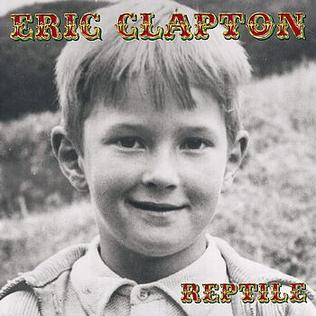
Reptile is the fourteenth solo studio album by Eric Clapton. The album was produced by Eric Clapton with Simon Climie and is Clapton's first album to include keyboard work by Billy Preston and background vocals by the Impressions. The album reached the Top 10 in 20 countries, topping the national album charts in three of them. In total, the album sold more than 2.5 million copies and gained several certification awards around the globe. To help promote album sales, music network VH1 streamed the album in full on TV.

Let's Roll is the twenty-sixth studio album by Etta James. It won a Grammy Award for Best Contemporary Blues Album in 2003, and also won a W. C. Handy Award as the Soul/Blues Album of the Year from the Blues Foundation in 2004.

The Stiff Upper Lip World Tour was a concert tour by the Australian hard rock band AC/DC in support of their fourteenth studio album, Stiff Upper Lip, which was released in 28 February 2000. This tour had 6 legs around the world lasting 11 months starting on 1 August 2000 in Grand Rapids, Michigan finishing on 8 July 2001 in Cologne, Germany.

Blues to the Bone is the twenty-seventh studio album by Etta James. The album contains a selection of twelve blues standards which are among her favourites. James and her sons Donto and Sametto James produced the album with Josh Sklair, which reached number four in the Billboard Top Blues chart.
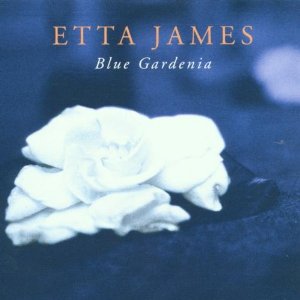
Blue Gardenia is the twenty-fifth studio album by Etta James, released through the record label Private Music. It was produced by John Snyder, who had worked with James on five of her previous studio albums. Blue Gardenia contains thirteen jazz standards from the 1930s, 1940s and 1950s. All of the standards were arranged by pianist Cedar Walton, with the exception of "Love Letters", which was arranged by Josh Sklair. Between November 2000 and February 2001, Snyder and Walton assembled musicians to record tracks while James was recovering from a flu; her vocals were added following her recovery. In addition to Walton, artists appearing on the album included Red Holloway on tenor saxophone and Dorothy Hawkins, James' mother, who provided vocals on the title track. Hawkins died in May 2002, less than a year after the album's release.

Heart of a Woman is the twenty-third studio album by Etta James released in June 1999 by RCA Records. The album consists of eleven love songs from her favorite female singers as well as a recording of her most popular song, "At Last". Recorded in March 1999, Heart of a Woman was produced by James and John Snyder with Lupe DeLeon as executive producer. James' two sons Donto and Sametto served as assistant producers. Guest musicians appearing on the album include Mike Finnigan, Red Holloway, and Jimmy Zavala. Critical reception of Heart of a Woman was mixed. The album peaked at number four on the Top Blues Albums chart of Billboard magazine.
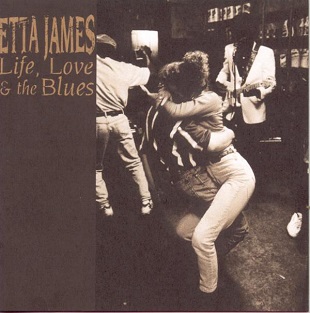
Life, Love & the Blues is the twenty-first studio album by Etta James, released in 1998. The album reached a peak position of number three on Billboard's Top Blues Albums chart.

12 Songs of Christmas is the twenty-second studio album and the first Christmas album by American blues singer Etta James. Private Music released the album in October 1998. Produced by John Snyder, the album includes standards arranged mostly by pianist Cedar Walton and solos by Walton, George Bohanon on trombone, and Red Holloway on tenor saxophone. Critical reception of the album was positive overall. Following its release, 12 Songs reached a peak position of number five on Billboard's Top Blues Albums chart.
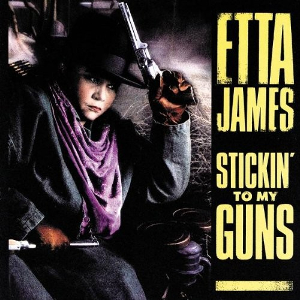
Stickin' to My Guns is the sixteenth studio album by Etta James, released in 1990. It was nominated for a Grammy for "Best Contemporary Blues Recording".
The AC/DC Club Dates/Rolling Stones Tour was a series of concerts done by the Australian hard rock band AC/DC. The band was a support act for the Rolling Stones' Licks Tour in Germany, but also performed together in Toronto, Canada.

The English singer Eric Clapton has released 22 video albums and concert films as well as 17 music videos. His commercially most successful video releases are the DVDs of his Crossroads Guitar Festival series. His 2007 release sold over two million DVD and Blu-rays to date, making it one of the best-selling music video DVDs ever to be released. The 2004 Crossroads Guitar Festival DVD was certified 10-times Platinum by the Recording Industry Association of America. Clapton's video releases are popular all over the world, especially in North and South America, Europe and Oceania. Clapton's small number of music videos are similarly successful. Every music video Clapton has released, has been shown more than 30 weeks in succession on MTV, VH1, MuchMusic, MTV2 and Fuse TV – rarely has any other artist been broadcast that often on a music TV channel throughout their whole career.
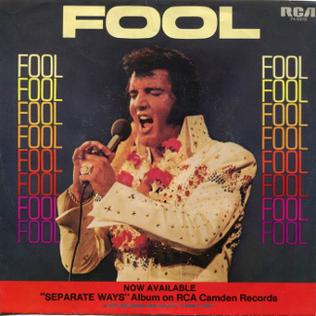
"Fool" is a 1973 song by Elvis Presley. It was adapted by songwriter Carl Sigman from a composition by James Last, titled "No Words". It was released as a single with the flipside track "Steamroller Blues". and then on the 1973 album Elvis.
